|
|
|
Sort Order |
|
|
|
Items / Page
|
|
|
|
|
|
|
| Srl | Item |
| 1 |
ID:
090779
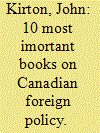

|
|
|
|
|
| Publication |
2009.
|
| Summary/Abstract |
In many ways the scholarly study of Canadian foreign policy has become a rich, robust, and rapidly growing field. It is now well over a century old, if one dates its inauguration from the publication of Goldwin Smith's Canada and the Canadian Question in 1891, a book that understood that Canada's relationship with the United States was properly part of, or even at the centre of the field.
|
|
|
|
|
|
|
|
|
|
|
|
|
|
|
|
| 2 |
ID:
153908
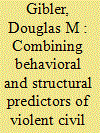

|
|
|
|
|
| Summary/Abstract |
Large-N studies of civil war overwhelmingly consider the state-specific structural conditions that make conflict likely. Meanwhile, policymakers often ignore these factors and instead search for patterns among the behavioral triggers of violence. This article combines these approaches. I use conflict narratives from the International Crisis Group’s CrisisWatch publications to cross-validate structural analyses of civil conflict and confirm the mechanisms that lead to outbreaks of violence in conflict-prone countries. I then correct for selection bias in the narrative data with an underlying model of conflict likelihood. I find that several indicators thought to be causally related to civil conflict do indeed continue to have an effect after selection. However, the narrative data overemphasizes both the importance of several low-intensity, separatist conflicts within developed democracies and the potential for conflict among oil-rich states. These analyses highlight the importance of combining structural, large-N analyses with qualitative assessments of conflict zones. My findings also provide support for a state-capacity explanation of conflict behavior.
|
|
|
|
|
|
|
|
|
|
|
|
|
|
|
|
| 3 |
ID:
193498
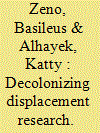

|
|
|
|
|
| Summary/Abstract |
Over the past decade, there have been increasing numbers of displaced scholars from the Middle East and Africa who have come under sustained pressures and threats from their governments; only a few of them have been able to relocate to European and North American academia through scholarships and grants.1 Even these temporary solutions for displaced scholars rarely result in sustainable institutional solidarity in the form of permanent teaching or professorial positions. The lack of institutional support, coupled with discriminatory and racialized immigration policies, pushes these few fortunate scholars to either accept exploitative conditions perpetuated by the neoliberal economy or leave academia altogether to support their families. These challenges, along with draconian economic sanctions and restrictions imposed by the US Treasury Department Office of Foreign Assets Control (OFAC) on citizens of countries such as Syria, Sudan, Iran, and Cuba are only a snapshot of what displaced scholars endure on a daily basis while trying to do research, care for their families, and compete with scholars with privileged citizenship status for shrinking opportunities in the academic job market.
|
|
|
|
|
|
|
|
|
|
|
|
|
|
|
|
| 4 |
ID:
193497
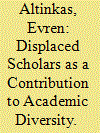

|
|
|
|
|
| Summary/Abstract |
Academic diversity has been an important consideration in hiring processes within academia since the late 2010s. The term diversity encompasses race, ethnicity, gender, religion, sexual orientation, geographical representation, and political beliefs. There are three significant considerations during the hiring process. To put it simply: “equity is the promotion of fairness and justice for each individual that considers historical, social, systemic, and structural issues that impact experience and individual needs; diversity is a measure of representation within a community or population that includes identity, background, lived experience, culture, and many more; and inclusion is the creation of an environment where everyone shares a sense of belonging, is treated with respect, and is able to fully participate.”
|
|
|
|
|
|
|
|
|
|
|
|
|
|
|
|
| 5 |
ID:
117454
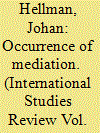

|
|
|
|
|
| Publication |
2012.
|
| Summary/Abstract |
Scholars of international mediation have paid insufficient attention to the determinants of mediation incidence. This is unfortunate, since a better understanding about what circumstances promote mediation occurrence would be of great benefit to other branches of the field, as, for example, mediation efficiency evaluation. This literature review addresses this topic, reviews the current literature, evaluates and problematizes some core concepts and assumptions, and suggests ways forward. It especially emphasizes the critical need of approaching the theoretical debates of international relations to provide a more solid base for mediation studies, and to enrich the field with studies that explore the potentials of a plurality of theoretical perspectives.
|
|
|
|
|
|
|
|
|
|
|
|
|
|
|
|
| 6 |
ID:
126640
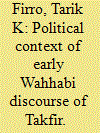

|
|
|
|
|
| Publication |
2013.
|
| Summary/Abstract |
This article compares the takfiri discourse (accusing people of being infidels) of the first and second generation of Wahhabi scholars with that of Muhammad Ibn 'Abd al-Wahhab, the founder of the Wahhabiyya. The article shows that these scholars had revised Ibn 'Abd Wahhab's position toward infidelity; a position which had been adopted by many Wahhabi scholars until the beginning of the nineteenth century. In their revision, they put an end to the ambivalent position toward takfir, emphasizing that warfare was the suitable means of interacting with religious and political opponents. To justify their approach, they reinterpreted not only the writings of the founder of Wahhabiyya but also those of Ibn Taymiyya and other Hanbali scholars. Their takfiri discourse remained alive among large segments of the masses and religious scholars in Sa'udi Arabia until today, though some Sa'udi kings and princes sometimes denounced it.
|
|
|
|
|
|
|
|
|
|
|
|
|
|
|
|
| 7 |
ID:
107335
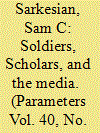

|
|
|
| 8 |
ID:
103246
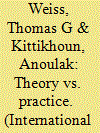

|
|
|
|
|
| Publication |
2011.
|
| Summary/Abstract |
This special presidential issue addresses the theory-practice question across major institutions and global challenges. First, what is the influence of scholars on institutions? What accounts for influence or the lack thereof? What type of future engagement should exist for scholars on these institutions? Second, what are acceptable theoretical approaches to a given global challenge? What are the existing policies and practices, and do they coincide with dominant scholarly approaches? What relationship would be most useful between theory and practice on any issue? The 51st International Studies Association Annual Convention and these pages explore the impacts of scholars on policymaking and institutions as well as the limitations of theory in responding to global challenges. Stereotypes obfuscate the complex reality that scholarship matters.
|
|
|
|
|
|
|
|
|
|
|
|
|
|
|
|
| 9 |
ID:
131530
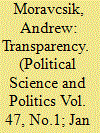

|
|
|
|
|
| Publication |
2014.
|
| Summary/Abstract |
Qualitative political science, the use of textual evidence to reconstruct causal mechanisms across a limited number of cases, is currently undergoing a methodological revolution. Many qualitative scholars-whether they use traditional case-study analysis, analytic narrative, structured focused comparison, counterfactual analysis, process tracing, ethnographic and participant-observation, or other methods-now believe that the richness, rigor, and transparency of qualitative research ought to be fundamentally improved.
|
|
|
|
|
|
|
|
|
|
|
|
|
|
|
|
| 10 |
ID:
096199
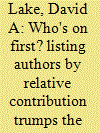

|
|
|
|
|
| Publication |
2010.
|
| Summary/Abstract |
Political science as a discipline lacks any convention on the order in which authors should be listed in co-authored publications. As a result, the order of authors' surnames currently provides no information to other scholars, hiring and promotion committees, and other reviewers about the relative contributions of each collaborator. This lack of information impedes the allocation of proper credit for scholarly contributions. Moreover, in collaborations between junior and senior colleagues, or other asymmetric status hierarchies, the absence of both information and any convention tends to favor more established scholars; this makes it more difficult for graduate students, untenured professors, and other vulnerable co-authors to negotiate for and receive appropriate credit. Listing authors by relative contribution is both more informative and fair. In publications where one author provides the necessary research funding, or a faculty member is not only a co-author but also a dissertation or other academic advisor, it is also appropriate to designate that collaborator as "last" or "senior author." In all cases, articles should carry a short statement indicating the division of labor between the co-authors, even or especially if the contributions are equal.
|
|
|
|
|
|
|
|
|
|
|
|
|
|
|
|
|
|
|
|
|